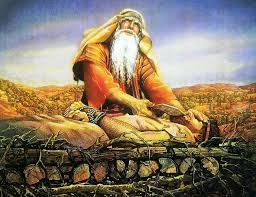Abraham Built an Altar,
Bound His Son Isaac and Laid Him on Top of the Wood
22: 9-10
Abraham built an altar, bound his son Isaac and laid him on top of the wood DIG: Where has God demonstrated His willingness to do as He is asking Abraham to do here? In the case of God’s sacrificing His one and only Son, how far did He go? How is Isaac a type of Christ?
REFLECT: Where do you get the strength to say, “Yes,” to God when everything else inside of you says, “No?” When have you gotten into trouble by letting your emotions get the better of you? Are your emotions the engine or the caboose? What drives your decision making?
Then they reached the place God had told him about. They must have been in agony for those three days. Why had God sent him so far? It would be the place where Solomon would later build the Temple of ADONAI in Jerusalem on Mount Moriah (Second Chronicles 3:1). Avraham’s offering of Isaac was to foreshadow all the other offerings to be sacrificed there, which in turn were also foreshadowing of the one great sacrifice that would be offered one day nearby, when the Father would offer the Son as the Savior of the world.360
Abraham built an altar there on Mount Moriah and arranged the wood on it. He had built altars at Sichem, Bethel, Hebron and at Beersheba. But this altar was different. Those altars were built to sacrifice animals; this altar was to sacrifice his only son. There would be no substitute for God’s only Son at Mount Calvary, where the Lamb of God had to be offered up in sacrifice for the salvation of the world. For God so loved the world that He gave His one and only Son, that whosoever believes in Him shall not perish but have eternal life (John 3:16).

Then he bound his son Yitz’chak. As stated previously, Isaac was a man and could have overpowered Abraham if he had wanted to, but Isaac (Hebrew: Yitz’chak) was obedient, if need be, unto death. The Hebrew word for binding occurs only here in the TaNaKh, and has become the actual name of this event in Jewish thinking. Jews refer to it as the akeidah, meaning the binding of Isaac. And as Yitz’chak was laid on the altar, on top of the wood (21:9), so Christ was laid upon the old rugged cross made of wood, and was obedient unto death. What a picture we have here!
If Isaac had the least doubt about his father’s intentions beforehand, they were all removed now, as his father bound him and laid him on the altar. As he gazed up into his father’s eyes, no doubt filled with tears, he saw the uplifted knife in his father’s hand ready to slay him. The Hebrew word slay is actually the Hebrew word for slaughter (22:10). Faith surrenders the best that we have to God, and holds nothing back. Jesus was offered up as a sacrifice by His Father (First John 2:2), and was obedient unto death (Philippians 2:8). Figuratively, the uplifted knife would fall on Jesus.
God was testing Avraham. The Hebrew word for tested, nasah, is usually translated to prove. Sixty years of preparation had gone into this moment. God had brought him through four very definite crises, each of which was a real exercise of faith. First, he was called to prove that he would leave his homeland, Ur of the Chaldeans. He was to leave his family. That was a real test for him and he didn’t do very well at first, but, nevertheless, he finally left. Then he was asked to prove that he would separate from Lot, his nephew. Abraham loved Lot; he wouldn’t have let him tag along with him if he didn’t. But the time came when they had to separate, and Lot went down to Sodom. Then there was the test with his boy; the son of Hagar, Ishmael. He loved that boy and he hated to be separated from him, but he had to prove that he would send him away. Now Abraham comes to this supreme test, the fourth great crisis in his life. He is asked to give up Yitz’chak, the son of promise. He doesn’t understand it, but he is willing to go through with it.361 Faith was driving this decision and emotion was in the back seat.



Leave A Comment